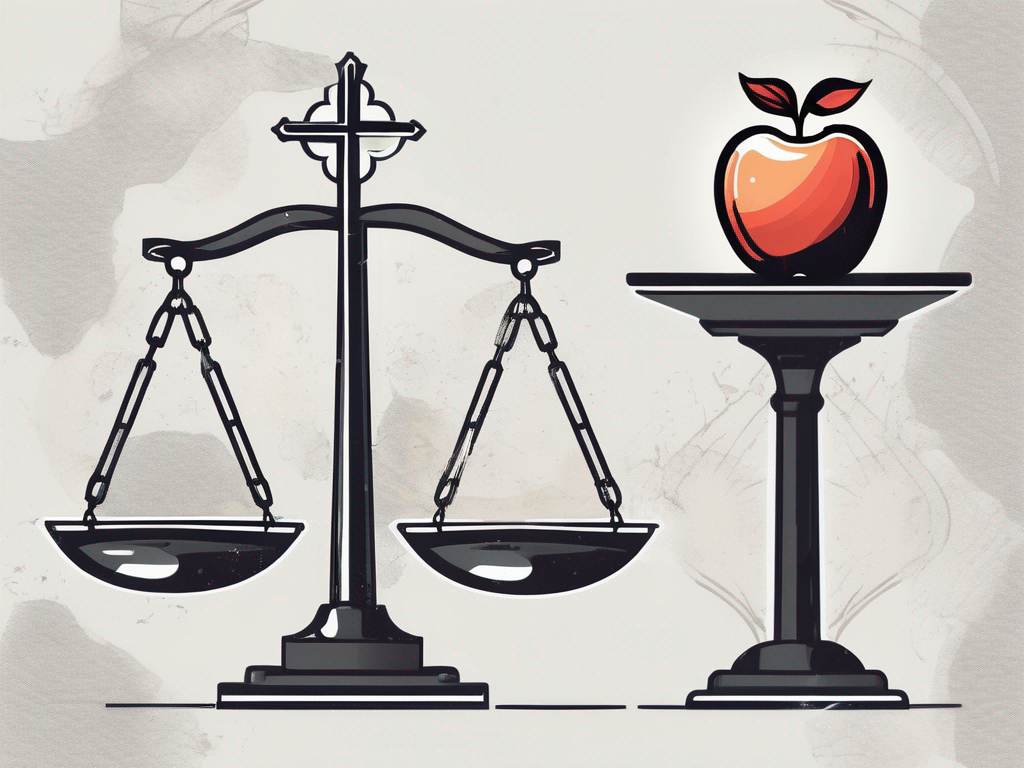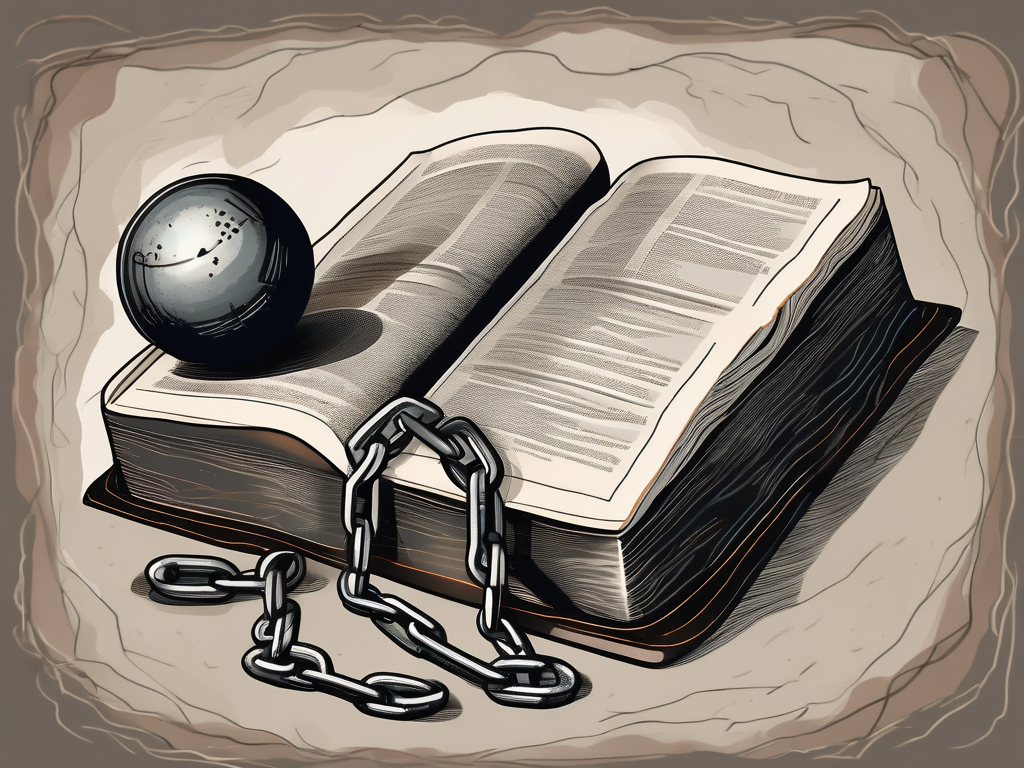Freedom is a fundamental concept that holds great significance in the Bible. Throughout its pages, we find various teachings, stories, and insights about what it means to be free in the eyes of God. In this article, we will explore the multifaceted nature of freedom as presented in the Bible. We will delve into the Old and New Testaments, examine the perspectives of biblical figures, uncover the link between freedom and salvation, understand our responsibilities in living as free individuals, and address some common misconceptions associated with freedom.
Understanding the Concept of Freedom in the Bible
Before delving into specific passages, it is essential to grasp the concept of freedom as it is portrayed in the Bible. In the biblical context, freedom is not merely the absence of physical constraints or external limitations. It is a state of being that encompasses both personal and spiritual liberation.
When we talk about freedom in the Bible, we are not just referring to the ability to do whatever we want without consequences. It goes beyond that. It is about being released from the chains that bind us, both externally and internally. It is about finding true liberation, not just in the physical realm, but also in the depths of our souls.
Freedom in the Old Testament
The Old Testament provides us with a foundation for understanding the divine concept of freedom. It reveals how God intervened to free the Israelites from their bondage in Egypt, parting the Red Sea and leading them towards the Promised Land through miraculous acts.
But freedom in the Old Testament is not solely about deliverance from physical slavery. It is about something more profound. It is about the freedom to live according to God’s will, to walk in His ways, and to experience His presence in our lives. It is about being set free from the bondage of sin and the consequences that come with it.
When God gave the Israelites the Ten Commandments and other laws through Moses, He was not restricting their freedom. On the contrary, He was showing them the path to true freedom. By following His commands, they would live a life of righteousness, justice, and spiritual liberation. It was through obedience to God that they would experience the fullness of freedom.
Freedom in the New Testament
In the New Testament, Jesus Christ brings a deeper understanding of freedom. Through His teachings and sacrifice, He offers freedom from sin and the opportunity for a personal relationship with God.
Jesus emphasized that true freedom comes from knowing the truth and living in accordance with it. He said, “If you hold to my teaching, you are really my disciples. Then you will know the truth, and the truth will set you free” (John 8:31-32, NIV). This freedom is not bound by external circumstances but rather rooted in the acceptance of God’s love, grace, and forgiveness.
When Jesus walked the earth, He not only preached about freedom but also demonstrated it through His actions. He healed the sick, gave sight to the blind, and set the captives free. His ultimate act of liberation was His death on the cross, where He paid the price for our sins and opened the way for us to be reconciled with God.
Through Jesus, we can experience a freedom that goes beyond the physical realm. It is a freedom that sets us free from the bondage of sin, guilt, and shame. It is a freedom that allows us to live in the fullness of God’s love and purpose for our lives.
So, when we talk about freedom in the Bible, we are not just talking about a concept or an idea. We are talking about a transformative experience that has the power to change our lives from the inside out. It is an invitation to walk in the freedom that God offers, to embrace His truth, and to live a life of purpose and meaning.
Biblical Figures and Their Interpretation of Freedom
The Bible provides numerous accounts of individuals who experienced and understood freedom in distinct ways. These figures serve as examples of the various facets of freedom.
Moses and the Freedom of the Israelites
Moses, chosen by God to lead the Israelites out of Egypt, played a pivotal role in demonstrating the importance of freedom. His obedience to God’s instructions and his determination to guide the Israelites towards the Promised Land showcased the transformative power of liberation from physical bondage.
As Moses led the Israelites through the wilderness, he faced numerous challenges and obstacles. However, his unwavering faith in God’s promise of freedom gave him the strength to persevere. He became a symbol of hope and inspiration for the Israelites, reminding them that their liberation was not only a physical journey but also a spiritual one.
Moreover, Moses highlighted the significance of the Israelites’ obedience to God’s laws, as they were meant to guide them towards a life of liberty and righteousness. He emphasized that true freedom comes from aligning one’s actions with God’s will and living in accordance with His commandments.
Jesus Christ’s Teachings on Freedom
Jesus Christ’s teachings on freedom went beyond the temporal liberation experienced by the Israelites. He emphasized the importance of a personal relationship with God and spiritual liberation from the bondage of sin.
Through His sacrificial death on the cross, Jesus provided a path to freedom for all humanity. He said, “So if the Son sets you free, you will be free indeed” (John 8:36, NIV). This freedom is not based on our own efforts but on faith in Him.
Jesus taught that freedom is found in embracing His love, following His teachings, and living a life transformed by the power of the Holy Spirit. He emphasized the need to let go of worldly attachments and desires, and to seek a deeper connection with God. This spiritual freedom allows individuals to experience true joy, peace, and fulfillment.
Furthermore, Jesus challenged societal norms and expectations, advocating for the freedom of the oppressed and marginalized. He showed compassion towards those who were considered outcasts, demonstrating that true freedom includes the liberation from social and cultural constraints.
In conclusion, the biblical figures of Moses and Jesus Christ provide profound insights into the multifaceted nature of freedom. Their examples teach us that freedom encompasses not only physical liberation but also spiritual emancipation and the pursuit of righteousness. By following their teachings and embracing a relationship with God, we can experience true freedom in all aspects of our lives.
Freedom and Salvation: A Biblical Perspective
According to the Bible, freedom is intricately linked to salvation. It is through God’s grace and the sacrifice of Jesus Christ that true freedom from sin and its consequences is attained.
When we delve into the depths of the biblical teachings, we find that the concept of freedom goes beyond a mere absence of physical or societal constraints. It encompasses a profound liberation of the soul, a release from the shackles of sin that weigh us down and separate us from God’s perfect plan for our lives.
The Role of Grace in Achieving Freedom
Understanding the concept of grace is essential in comprehending the relationship between freedom and salvation. Grace, defined as the unmerited favor of God, provides the foundation for our liberation from sin.
God’s grace is a divine gift, freely given to us despite our unworthiness. It is through this grace that we are able to experience true freedom, as it is not based on our own efforts or merits. The apostle Paul, in his letter to the Ephesians, stated, “For it is by grace you have been saved, through faith—and this is not from yourselves, it is the gift of God” (Ephesians 2:8, NIV). This powerful verse emphasizes that our freedom from sin and the resulting salvation is not something we can achieve on our own but is a gift from God.
God’s grace is not a license to continue living in sin, but rather an invitation to turn away from it and embrace a life of righteousness. It is through this grace that we are empowered to break free from the chains that bind us, to overcome the temptations that entangle us, and to live in the fullness of God’s love and purpose.
Freedom from Sin According to the Bible
The Bible teaches that everyone is enslaved to sin. The apostle Paul, in his letter to the Romans, writes, “For all have sinned and fall short of the glory of God” (Romans 3:23, NIV). Sin, in its various forms, separates us from God and hinders our ability to experience true freedom.
However, through acceptance of Jesus Christ as Lord and Savior, we can experience freedom from the bondage of sin. Jesus, through His sacrificial death on the cross, paid the price for our sins and made a way for us to be reconciled with God.
Paul, in his letter to the Romans, beautifully describes this freedom: “For sin shall no longer be your master, because you are not under the law, but under grace” (Romans 6:14, NIV). This verse reminds us that true freedom comes when we are no longer held captive by our sinful nature.
When we accept Jesus into our lives, we are set free from the power of sin. We are no longer bound by its grip, but instead, we are empowered to live a life that is pleasing to God. This freedom allows us to experience the fullness of God’s love, to walk in His truth, and to fulfill the purpose for which we were created.
It is important to note that freedom from sin does not mean that we will never stumble or make mistakes. We are still human, and we will continue to face challenges and temptations. However, through the power of the Holy Spirit, we have the strength and guidance to overcome sin and live in the freedom that Christ has provided for us.
As we journey through life, let us continually seek God’s grace and rely on His strength to walk in the freedom and salvation that He has so graciously bestowed upon us. May we never take this freedom for granted but instead, may we live in a way that reflects the transformative power of God’s love and grace.
The Bible’s Guidance on Living in Freedom
Living in freedom carries with it a responsibility to honor God and treat others with love and respect. The Bible provides guidance on how we should navigate our lives as free individuals.
Freedom and Responsibility
Freedom without responsibility can lead to chaos and destruction. The Bible teaches that, as free individuals, we are called to use our freedom wisely for the benefit of others and the glory of God.
Galatians 5:13 states, “You, my brothers and sisters, were called to be free. But do not use your freedom to indulge the flesh; rather, serve one another humbly in love” (NIV). This verse highlights the responsibility to live in accordance with God’s commandments, caring for others with a spirit of humility and love.
Freedom and Love for Others
Love for others is an essential aspect of living in freedom. Jesus taught that the greatest commandments are to love God and to love our neighbors as ourselves (Matthew 22:37-39).
Living in freedom means extending love, compassion, and forgiveness to others. It means embracing the freedom to serve, support, and uplift those around us, fostering an environment of unity and harmony.
Misconceptions About Freedom in the Bible
Unfortunately, there are misconceptions surrounding freedom in the Bible that lead to misunderstandings and misinterpretations. Let us address some of these misconceptions.
Freedom vs. Lawlessness
Some may perceive freedom as the ability to live without any rules or moral boundaries. However, the Bible teaches that freedom is not synonymous with lawlessness. True freedom comes from aligning our lives with God’s principles and living in obedience to His commands.
As we read in James 1:25, “But whoever looks intently into the perfect law that gives freedom, and continues in it—not forgetting what they have heard, but doing it—they will be blessed in what they do” (NIV). This verse emphasizes the importance of following God’s law, which leads to true freedom and blessings.
Freedom vs. Slavery to Sin
Another misconception is viewing freedom as the ability to indulge in sinful desires without consequence. However, the Bible teaches that such indulgence leads to slavery to sin, not true freedom.
Paul wrote in Galatians 5:13, “For you were called to freedom, brothers and sisters. But do not use your freedom as an opportunity for the flesh, but through love serve one another” (ESV). This verse reminds us that true freedom is found in living a life free from the entanglements of sin.
As we explore the Bible’s teachings on freedom, we come to understand that it is not just a concept but a divine invitation. It is an invitation to experience liberation from sin, restoration of our relationship with God, and a purposeful life in service to others. May we embrace this freedom and live as true ambassadors of God’s love, grace, and truth.












